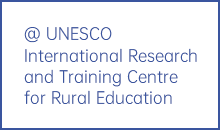In order to explore the interlinks between education and poverty reduction and to promote the implementation of the UN 2030 Agenda for Sustainable Development, especially its Goal 1 and Goal 4, with the support of the Ministry of Education of the People' s Republic of China, the Chinese National Commission for UNESCO, and the UNESCO Beijing Office, the UNESCO International Research and Training Centre for Rural Education ( INRULED ) has selected a number of cases of poverty reduction through education from the variety of practices in China for global sharing.
This publication includes three chapters, with the first chapter reviewing the relationship between education development and poverty reduction from an international perspective, and the current global implementation of the United Nations Sustainable Development Goals, especially Goal 1 and 4.
Chapter II provides an overview of the history of China' s poverty reduction in and through education, with a focus on the implementation of targeted poverty alleviation since 2012, including the overall strategy, policy framework, the specific strategies for targeted poverty alleviation through education, as well as the remarkable results achieved.
Chapter Ⅲ selects a number of cases of China' s poverty alleviation through education which showcases the specific policies and practices in five aspects:
· Ensuring the Universality and Equity in Education;
· Improving the Quality of Education in Poverty-stricken Areas;
· Empowering poor families in China through technical and vocational education and training ( IVET ) and skills development;
· Boosting rural industrial and economic development by higher education institutions and vocational schools;
· Cross-sector collaboration for poverty alleviation through education.
We believe that China ' s experience in the practice of education for poverty alleviation belongs to both China and the world, and it can be the reference for the international community committed to education for poverty alleviation. However, it needs to be stressed that all countries in the world have different contexts and development status quo, and that poverty reduction standards, methods and paths will inevitably be different. In this regard, strategies and approaches that work are those relevant to national context and drawn out from local practices.
The editors of this publication aspire to strengthen exchanges and cooperation in education for poverty alleviation with relevant institutions in various countries, accumulate concerted efforts towards the United Nations 2030 Sustainable Development Goals, and make greater contributions to building a global community with a shared future and pursuing common development.

Purchase Link: https://item.jd.com/14056104.html













